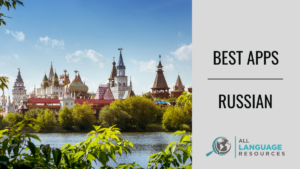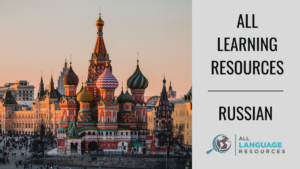You’re probably familiar with the words parka, mammoth, or even balaclava. These are all English words borrowed from the Russian language.
The Russian language is the most spoken of all the Slavic languages, with over 258 million speakers. It is spoken as the primary language by the majority of people in Russia, and also as a second language in several other countries.
Whether you’re interested in the original works of Dostoevsky, Tolstoy, and Chekhov, planning to travel to Russia in the future, or you’re a science buff interested in reading Russian scientific publications, learning Russian is an exciting journey to embark on. If you simply have an interest in the Russian language and culture, or you just love a challenge, take the leap and start learning.
If you already know how to learn Russian and want to cut to the chase and read our reviews and recommendations on Russian language resources, check out these posts:






Whatever your reasons are for learning Russian, this is the perfect place to get a better understanding of how the language works, which resources to consider, and a few Russian learning tips.
Learn Russian on your own for free with this self-study guide. How to speak Russian? How long does it take to learn Russian? Best way and easiest way? Find out here. Keep reading!
Table of Contents
How to Learn Russian On My Own
One of the easiest ways to learn Russian on your own is to use an app-based course. Signing up for a course gives you a framework for your studies and helps to ensure you cover all key aspects of the language. Using an app is also convenient because you can do your daily lesson on your phone no matter where you are.
Pimsleur’s app-based Russian course is one of the best ones you can use. It has a somewhat immersive approach and uses a lot of audio content to help you master both listening comprehension and pronunciation. It also encourages you to speak out loud in every lesson, which is great for building confidence!
Best Way to Learn Russian
The best way to learn Russian will depend on your level of the language, your learning style, and your ultimate goals for using the language. In this post, we share 10 ways you can learn Russian so that you can find the method and resources that are right for you.
Immerse Yourself in the Russian Language
There are two main ways to learn Russian: 1) the translation method, and 2) the immersion method. Immersion is the best way to learn Russian, especially if your goal is to speak the language. Here’s why…
Why the Translation Method Falls Short
With the translation method, you study a language before you use it. In fact, some Russian courses that use the translation method don’t have you use the language at all. Courses that follow this method typically give you a list of Russian words with their English translations. You’re expected to memorize the translation to “learn Russian”.
When the time comes to learn grammar you’re taught a grammar rule and then given a series of fill-in-the-blank or matching exercises using random Russian sentences. These sentences are based on the grammar rule you’re learning, and they are rarely useful in a real conversation.
Learning Russian this way does little to prepare you for using the language in the real world. When it comes time to speak Russian you’re stuck translating from English in your head before you can say anything.
How Immersion Works When Learning Russian
With the immersion method, you use the language before studying it. You learn whole phrases without necessarily knowing the exact definition for each word (at least at first). Then you start mixing and matching these phrases to form your own sentences.
Russian immersion courses also include a lot of listening practice. You’ll listen to whole conversations or dialogues to quickly level up your listening comprehension skills. These skills are a huge asset once you start talking with native Russian speakers.
If you’re using the Immersion method you start to learn grammar and exact vocabulary only after you already have experience listening to Russian and either writing or speaking whole phrases.
This approach actually makes grammar easier to learn and remember. By constantly listening to Russian conversations and using stock phrases, you start to develop a sense of what’s correct and what’s incorrect when it comes to grammar and vocabulary. You’ll notice when you hear a grammar mistake because it doesn’t sound or feel right.
This is more or less the same way you learned your native language. Toddlers don’t start talking by learning grammar or memorizing a dictionary. They start learning by constantly listening to and imitating the native speakers around them.
Once you do start to study Russian grammar it will be much easier for you to understand after having used the language so much already.
This is the biggest reason why we recommend an immersion-first approach over a translation-first method. There are a few tried and true language programs that help you get started right. See our Best Russian Apps post for recommendations.
Listen to Russian Language Podcasts
Podcasts are one of my favorite tools for learning Russian. A good language-learning podcast will improve your listening skills and teach you useful Russian words. There are a lot of Russian podcasts available, but your level in the language will determine which is best for you.
Watch Russian Movies and TV
Watching movies and TV is an excellent way to practice your language skills while at the same time exposing yourself to Russian culture. Many people are surprised to find that Russian cinema has a long history dating all the way back to the Russian Empire. Russian TV also has a wide variety of shows ranging from drama, and science fiction, to romance.
How to Learn Russian with Movies and TV Shows
Here’s an easy way you can use these movies and TV shows to help you learn Russian.
Step 1: Pick a clip from a Russian movie or show and watch it a few times without any subtitles. Do your best to understand what’s going on in the scene, and make note of the words and phrases you recognize. You should use the words you know to help you guess some of the words and phrases you don’t.
Step 2: Now watch the same clip again with Russian subtitles. The subtitles might reveal some words you know but couldn’t pick out when they were spoken. This is a common occurrence for beginners. Often times a word you know is hard to understand when it’s used in a full phrase by native Russian speakers. That’s one of the things this exercise will help you to improve. Just as you did in the first step, use any words you recognize to help you figure out the meaning of any unfamiliar words.
Step 3: Now you can play the clip with English subtitles if you’re still stuck on any new words or phrases. It’s a good idea to pause the clip and make a list of any new words so you can review them later.
This exercise will help you improve your listening skills and increase your Russian vocabulary!
It’s not always easy to find Russian movies or shows with both Russian and English subtitles. Even if you do manage to find a clip with subs, it can be a pain to switch back and forth between them. That’s why we recommend FluentU if you want to learn Russian with movies or shows.
Practice Russian Pronunciation
For you to be able to speak confidently and articulate Russian words with ease, you need to practise your pronunciation.
Why Learning Russian Pronunciation Can Be Difficult
I’ll be honest, when I started learning Russian and started to listen to Russian words and phrases, I thought some of the words sounded more like noises than an actual language. Russian combines a lot of consonants together in ways that you will never see in the English language. Learning to pronounce Russian correctly sometimes feels like calisthenics for your tongue and mouth.
The Power of Learning Russian Pronunciation
That being said, don’t overlook Russian pronunciation. Learning correct pronunciation will not only make it easier for native speakers to understand you, but it will also help you to understand them!
When you physically know how to position your mouth and tongue to correctly pronounce Russian sounds, the language begins to sound a lot less foreign. Something about knowing how to pronounce a sound yourself makes it easier for you to pick out and understand it when someone else is speaking. This is what makes learning pronunciation so powerful.
Learn Russian Grammar
Grammar is arguably one of the most difficult parts of learning Russian. Because Russian comes from the family of Slavic languages, its grammar differs quite a bit from English. Because of this, it takes longer to learn how to correctly say basic Russian phrases than in other languages more closely related to English like Spanish or French.
This is another reason we recommend using the immersion method to learn Russian. With the immersion method, you’ll start to use basic phrases to read, write, and speak without getting hung up on the intricacies of Russian grammar rules. You won’t understand word for word what you’re saying, but you will know the basic meaning of what’s being said.
Start using these phrases enough and you will start to develop a sort of sixth sense for Russian. You’ll have heard enough Russian to know when something sounds correct or not. You won’t necessarily know why a particular phrase sounds wrong, you’ll just know that’s not how it’s usually spoken.
This grammatical sixth sense makes it a lot easier to learn grammar when the time comes.
Speak Russian as Much as Possible
For many beginners, no aspect of learning a foreign language seems more daunting than speaking with real people. Many language learners are afraid to make mistakes. Others are scared of not understanding what they hear.
This fear holds a lot of Russian learners back. They put off speaking for as long as they can, telling themselves that one day they’ll know enough grammar and vocabulary that they won’t be so nervous about speaking Russian. In their mind that’s the day they will be “ready” to start talking with people.
The problem is that no one is ever truly ready to speak a foreign language for the first time. No matter how long you’ve been studying Russian, the first time you speak with someone you will make mistakes. You will mispronounce sounds, forget words you already know, and you’re likely to say something that doesn’t make sense from time to time.
This is part of the learning process. It’s these kinds of mistakes that help you build confidence and improve your speaking skills. If you are serious about becoming fluent in Russian it’s important to speak it as much as you can.
How to Practice Speaking Russian
Here are some ways you can practice speaking Russian, no matter your level of the language.
Language Exchanges
The first is to find a language exchange partner. This would ideally be someone who is a Russian native speaker and is learning English as a foreign language. The idea behind a language exchange is that you and your partner help each other practice your respective target languages.
You can also take your search offline. If you live near a major city the odds are that there is a language learning club or conversation group somewhere in your area. These groups can be a great way to connect with other Russian learners and native speakers. Meetup.com is one site you can use to search local groups.
Another option is to see if your local university has any sort of speaking club for Russian or foreign languages in general. Most colleges have foreign language programs and offer free conversation clubs to help their students get free speaking practice.
Online Russian Lessons
Another way to get speaking practice is to learn Russian online with a teacher. A Russian teacher will know what the most common issues are for native English speakers when learning Russian. They will also know how to help you overcome these difficulties much quicker than if you learned independently.
There’s also a lot of flexibility when you’re learning Russian with a teacher. If you want, your teacher can guide your language learning journey and provide you with a detailed learning program, so that all you have to do is show up to the lessons and complete any assigned homework. On the other hand, if you’re an independent learner, your teacher can be more of a tutor. You can provide the direction for the lessons and your teacher can help you with whatever specific topic you choose.
Start Reading Russian
Beginners might be tempted to skip the Cyrillic alphabet and use English transliterations of Russian words to read Russian. However, reading Russian isn’t as difficult as you might think.
The Cyrillic alphabet is a mix of letters you recognize from English and letters you’ve likely never seen before. At first glance, this makes reading in Russian seem intimidating. It’s true that learning to read the Russian alphabet isn’t as easy as reading other foreign languages like Italian, Spanish, or German.
But when you break down the Cyrillic alphabet things aren’t as difficult as they seem. There are 42 sounds in the Russian language. 36 of them are consonants and 6 of them are vowels. This is slightly less than the 44 sounds of the English language.
Also, the Russian language is a lot more phonetic than English. This means Russian is written the way it sounds, and vice versa (the same can’t be said of English). So once you learn Russian letters, you shouldn’t have a difficult time reading the language.
You can easily learn to read the Russian alphabet in a couple of weeks (you could even learn it in a single week if you pushed yourself). The most confusing thing about reading Russian isn’t the letters you don’t recognize, but the ones you do. A lot of English-looking letters in the Cyrillic alphabet make totally different sounds and it’s easy to get confused at first.
For instance, the Russian letter “в” looks a lot like an English “B”. But the Russian в actually makes a sound like the English “v”. Also, the Russian “р” actually makes a sound close to the English “r” sound.
It will take some practice before you get used to these kinds of differences, but after you do it’s a lot easier to read in Russian.
There’s a wonderful free app that teaches you to read, called Russian Cyrillic in 3 Hours. It’s available for both iOS and Android. It’s a fantastic primer on the Russian alphabet and definitely worth checking out!
Focus on Common Russian Words and Phrases
Learning the most common words and phrases in your target language is a powerful language learning hack that you can use to quickly increase your Russian language skills. In every language, some words are used more often than others. By focusing on the most frequently used words you will greatly increase your ability to understand and speak Russian.
Think of this hack like Pareto’s 80/20 rule applied to language learning. The majority of the vocabulary you use will come from a small number of Russian words (small being relative to all the words in the language).
I recommend starting out by learning the most basic form of the most common Russian verbs, adjectives, and nouns. You can start with the top 100 most frequently used words and then move on to the top 200, 300, etc. Here’s a list of the most frequently used Russian words to get you started.
An easy way to commit these words to memory is to make flashcards for them using a spaced repetition flashcard system like Anki or Memrise. But instead of creating flashcards with the Russian word on one side and its English translation on the other, try creating cards with the Russian word on one side and a picture on the other.
Using pictures of a word’s meeting will help you stay immersed in the Russian language and help keep you from having to constantly translate things in your head from your native language.
Visit a Russian-Speaking Country
A trip to a Russian-speaking country can be a great way to immerse yourself in Russian culture as well as the language. If you’re a beginner I recommend joining an immersion program through a local university or language school in the country you want to visit. These programs are specifically designed to provide an immersion experience suitable for new learners.
If you travel to a foreign country with a low level of the local language, you’re unlikely to improve your language skills while you’re there. People at tourist spots will probably speak English with you. Outside of tourist spots, locals won’t be in the mood to slow down in order to help you practice speaking Russian with them.
Intermediate to advanced learners who can already speak the language proficiently will benefit from an unstructured trip to Russia or another country, but beginners shouldn’t expect a magical immersion experience by just wandering around a new place.
Easiest Way to Learn Russian
The easiest way to learn Russian depends a lot on your learning style. For some people, the easiest way to learn may be to pay for a private online tutor, there are a few platforms that can match your schedule and your budget. This gives you a lot of accountability and also provides built-in speaking practice.
But if you learn better through reading or listening, you could prefer a textbook or an audio course instead. Playing to your strengths and selecting a course that matches your learning style will make learning Russian much easier for you.
How Long Does it Take to Learn Russian?
The Foreign Services Institute (FSI) ranks Russian as a Category IV language that takes the average English speaker about 1,100 hours of dedicated study to learn. This means that if you study for one hour every single day, you should achieve basic fluency in Russian within three years.
Of course, your personal circumstances also play a role. If you speak multiple languages already you will likely find it easier to learn Russian more quickly than the average person. If you are lucky enough to have a close friend or family member who speaks Russian, you also have a leg up.
How to Speak Russian
The only way to learn how to speak Russian is to actually speak it, regularly and with real people. You can find many free resources to help you with your speaking practice, like the ones mentioned in this article. Language Exchange programs also provide a fun, free way to connect with other language learners virtually for conversation.
That said, it is also a good idea to get your feet under you at least a little bit before you dive into a conversation. Picking a course that focuses on conversational skills, instead of reading and writing, can help you get up to speed quickly.
How to Learn Russian for Free
Yes, it is possible to cobble together a Russian course by yourself. There are many podcasts and YouTube channels that are decent. Some of Russian language programs have free sections that can give you a good foundation in listening comprehension, grammar, and even pronunciation. Look for specific recommendations in our Best Apps and Best Courses posts.
You can also find excellent free resources on YouTube, like the ones recommended in this article.
Many public libraries also offer access to language-learning resources. It’s about time to visit your local library to see what’s available…it may surprise you!

